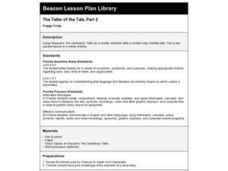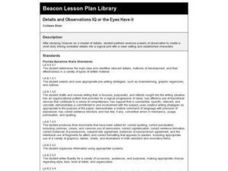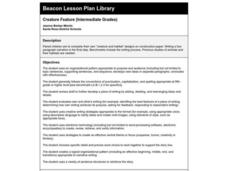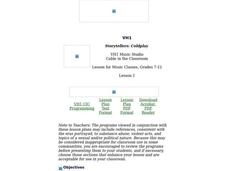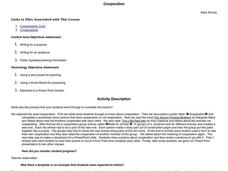Curated OER
Yummy Adjectives
Fourth graders recognize and brainstorm descriptive adjectives to use in their writing. They work in pairs to take a taste and touch test and record their adjectives used to describe the food and knick-knacks on handout. This is a great...
Curated OER
Word Processing With Pizazz
Young scholars use a word processor and some of its tools to create an exciting and visual autobiography. They download a sample letter and then create one of their own.
Curated OER
Uniforms vs. Fashion: Want to Take a Side?
Seventh graders write a draft of a persuasive essay to the principal addressing the issue of whether or not Three Oaks Middle School should adopt uniforms. This lesson get your students motivated to try persuasive writing!
Curated OER
The Teller of the Tale, Part 2
Students discuss character types and their qualities. They select two characters and write about their dress, speech, habits, attitudes and beliefs. They write a monologue as the characters presenting a moral theme.
Curated OER
Strong Verb Image Makers
Students use description language to clarify ideas and create vivid images in an essay focusing of strong verbs. They discuss weak verbs and explore that the better image the words create, the better the reader understands the text.
Curated OER
Product Persuasion
Students examine various products and analyze the marketing strategies used to entice consumers. They bring in a product they like to use, and using persuasive writing, they write their own advertisements for their products.
Curated OER
Newsworthy Fairy Tales
Third graders review common fairy tales and work in teams to rewrite the fairy tales as news articles. They answer questions using the 5 Ws (who, what, where, when, why). Student articles include eye-catching headlines.
Curated OER
Details and Observations IQ or the Eyes Have it
Fourth graders study Chaucer as a master of details. Then, they create a short story linking unrelated details into a logical plot with a clear setting and established characters. This lesson has some excellent worksheets attached!
Curated OER
Creature Feature
Students work in pairs to create a creature and its habitat out of construction paper. Then students write a narrative to describe the animal and its habitat.
Curated OER
The Green Man
Students examine the significance and symbolism of The Green Man. They create a Green Man using a monochromatic color scheme.
Curated OER
Let the Good Times Roll
Young scholars read an online New York Times article and investigate the Mardi Gras celebration in New Orleans. They examine how Hurricane Katrina affected the celebration. They design a float that represents the Mardi Gras celebration.
Curated OER
Traditional Values vs. Modern Culture in the Asian Community
Students examine Chinese culture and values. They research the teachings of Confucius, create posters, write short stories, and analyze the history of and present state of gang culture through research, discussion, and writing.
Curated OER
Immigration: A Cultural Perspective
Students investigate immigration and migration patterns near Pittsburgh, and distinguish between voluntary and involuntary migrants. They evaluate the importance of urban villages in relation to the immigrant experience.
Curated OER
Finding Our Place in Time
Students utilize interviewing skills of an historian to research the time period of the 1970's. They use prior knowledge of the 1960's to explain the mood of the country in the 1970's.
Curated OER
Araceli Solis Butterflies Unit
Third graders study the life cycle, eating habits, habitats, and migration patterns of butterflies in this series of lessons.
Curated OER
Cooperation
Students, in groups, "Build An Animal where they need to cooperate in order to be successful and then make a storyboard for a Powerpoint presentation.
Curated OER
Chops and Axes - A Jazz Talk Show
Young scholars listen to, analyze, and describe music. They gain an understanding of music in relation to history and culture.
Curated OER
Can You Hear a Story?
Students listen to, analyze, and describe music. They explain relationships between music, the other arts, and disciplines outside the arts.
Curated OER
Portrait Sculptures
Eighth graders study Marisol's art work by comparing ad contrasting several sculptures. They create a 3-D portrait of a person they either know personally, or to portray a social issue. The sculpture be made of a cardboard structure they...
Curated OER
Talking Rocks
Third graders consider the differences between pictographs and petroglyphs. They create symbols from a story about their worlds. They make pottery art.
Curated OER
The Shakespeare Crowd
Students study the life and times of Shakespeare. They read and analyze one of his plays and use the Internet and videos to gain an understanding of how Shakespeare engaged his audiences, then and still today.
Curated OER
The House at 97 Orchard Street
Students examine the living quarters and belongings of immigrant families living in one tenement building spanning the years from 1830 to 1940. They explain how the national background of immigrants added to the "melting pot" of American...
Other popular searches
- Learning Styles
- Leadership Styles
- Conflict Resolution Styles
- Architectural Styles
- Poetic Style
- Classical Music Styles
- Artistic Style
- Conflict Management Style
- Art Styles
- Personal Management Styles
- Communication Styles
- Architecture Styles





